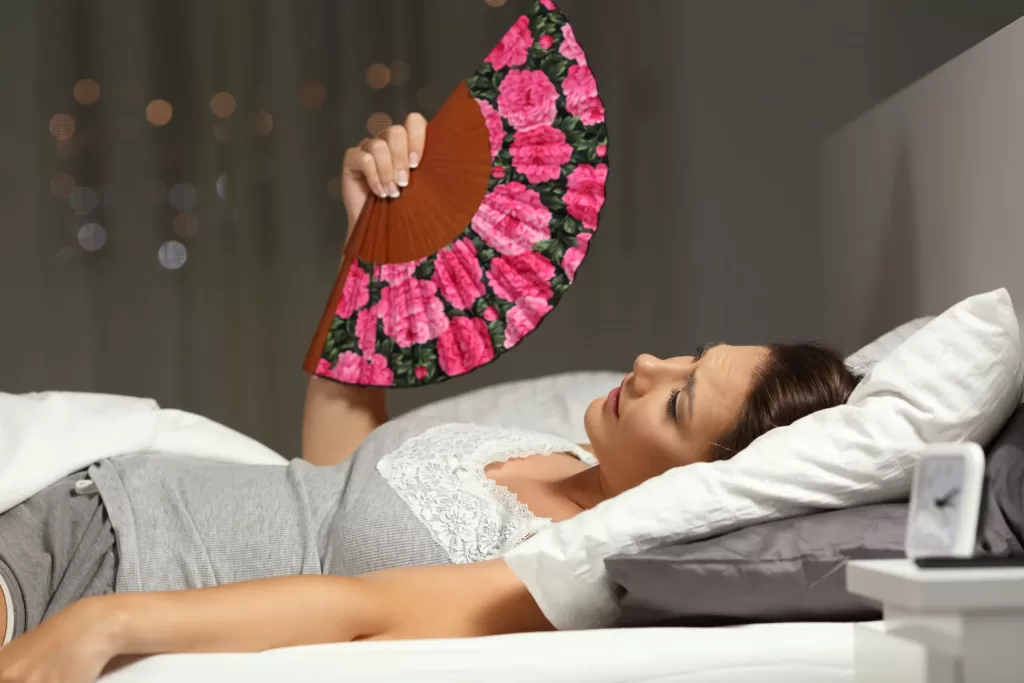Why am I sweating at night?
Medically Reviewed by Dr Ali Zavery
Last updated on 14.06.2024
If you regularly wake up with your pyjamas or sheets drenched in perspiration for no apparent reason, you’re probably experiencing night sweats. While most people get a bit overheated now and then, ongoing night sweats can be a sign of a serious medical problem, and it is very important to seek medical attention. Here are some of the questions that your doctor is likely to consider if you are sweating at night:
1. Could it be menopause or other hormonal changes?
In women, menopause and other hormonal changes are the most common causes of excessive sweating at night. This includes perimenopause, pregnancy, and premenstrual syndrome (PMS). For women with severe perimenopausal sweats, hormone replacement therapy (HRT) may be recommended, though it’s not suitable in all cases. On average, Australian women experience menopause between 45 and 60 years of age. Menopause before the age of 40 is considered “premature”. Your doctor can help diagnose the above conditions, based on history, examination and potentially blood tests and other investigations.
2. Have you checked medication side effects?
Various medications can cause night sweats, as a side effect- including drugs for depression, diabetes, high blood pressure, and steroid medications like prednisolone. Even common over-the-counter treatments such as paracetamol and aspirin can have this side effect. If sweating at night is bothering you and you suspect certain medications could be to blame, you should speak to a doctor, as they may be able to confirm this, and suggest a suitable alternative.
3. Could it be an underlying medical condition?
Aside from menopause, many other medical conditions can be linked to night sweats. Short term infections such as the common cold, influenza, and other viral illnesses may cause sweating at night for a few days. However, more serious or chronic (long term) infections can cause fevers and/or prominent night sweats that continue for days, weeks or even months- including chest infections, endocarditis, tuberculosis, brucellosis, HIV infection, bone or joint infections, or an underlying abscess.
Other medical causes of night sweats include sleep disorders (e.g. sleep apnoea), stroke, thyroid disease, autoimmune conditions, and certain cancers such as leukemia and non-Hodgkin’s lymphoma.
Idiopathic hyperhidrosis, where the body makes excess sweat without a clear reason, is another uncommon cause of sweating at night.
In all of these cases, other symptoms or physical findings may be present, which can help the doctor identify the condition. Blood tests and imaging will usually allow a firm diagnosis to be reached.
4. Are stress or anxiety an issue for you at the moment?
Stress and anxiety can activate the body’s “fight or flight” response, leading to night sweats. Managing stress through relaxation techniques before bed, such as reading or taking a warm bath, can be helpful, but are not always enough to really get on top of the problem. If stress and anxiety are impacting you in your day to day function, you should speak to your GP for further advice.
5. Are lifestyle factors or your home environment to blame?
The choice of sleepwear, bedding, and room temperature can significantly affect body heat regulation. To prevent overheating and sweating at night:
- Wear loose, lightweight pyjamas made from natural materials like cotton or linen.
- Use breathable, lightweight bedding and adjust it as needed.
- Sometimes, mattress protectors or electric blankets can be made of less breathable materials, and may contribute to overheating and sweating at night.
- Maintain a cool bedroom environment using a fan, air conditioning (or an open window if appropriate!). In winter, make sure your home heating system is not set too high.
- Ensure you are well hydrated.
Certain lifestyle choices and dietary factors can exacerbate night sweats. This includes alcohol, smoking, caffeine intake, eating spicy foods, and some “recreational” drugs. Avoiding these triggers may help to eliminate excess sweating.
Regularly sweating at night? When to see a doctor:
It’s very important to speak to a doctor if you are having unexplained night sweats. If you are sweating at night, and also have unexplained weight loss, pain, fevers, a cough or gastrointestinal symptoms, then you should urgently seek medical advice from your local GP or clinic.



